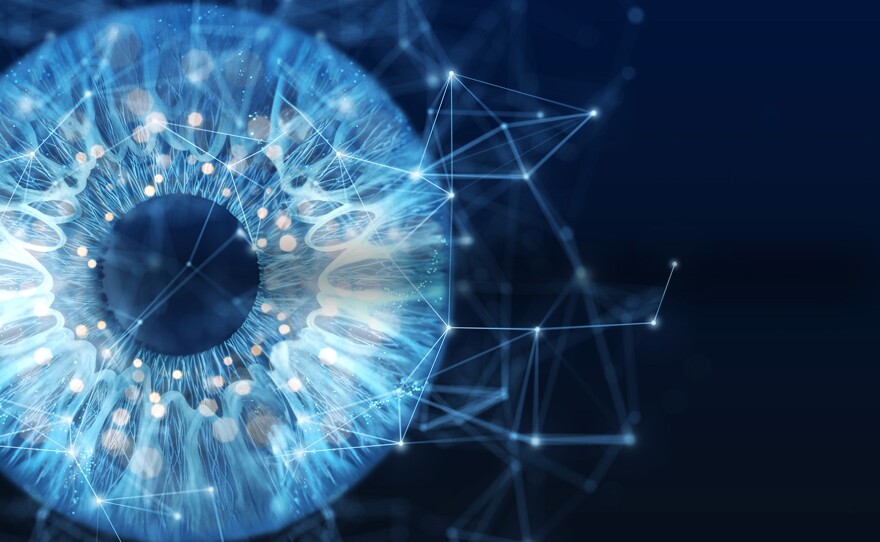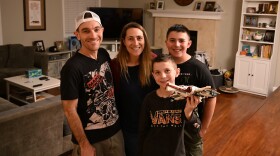Premieres Wednesday, March 27, 2024 at 9 p.m. on KPBS TV / PBS App + Encore Sunday, March 31 at 2 p.m. on KPBS TV and 9 p.m. on KPBS 2
Can we harness the power of artificial intelligence to solve some of the world’s most challenging problems without creating an uncontrollable force that ultimately destroys us? New A.I. tools like ChatGPT can now answer complex questions, write essays, and generate realistic-looking images in a matter of seconds. In NOVA “A.I. REVOLUTION,” correspondent Miles O’Brien meets some of the scientists who are at the forefront of A.I. advancement and explores the promise, perils, and possible future of this unprecedented technology taking the world by storm.
“The conversation around A.I. in our world is changing rapidly every day,” said correspondent Miles O’Brien. “‘A.I. REVOLUTION’ aims to show people what this new technology is capable of, as well as some of the concerns that emerge when you are creating something that has the power to perceive things far beyond the scope of our own understanding of the world.”
“A.I. REVOLUTION” dives into how scientists have modeled A.I. to mimic the human brain in so-called neural networks on powerful supercomputers. The film highlights the development of AlphaGo, software created to play the Chinese board game, Go — a notoriously complex strategy game. Tasked with beating reigning champion Lee Sedol, A.I. researcher Mustafa Suleyman details the strategies that the team at DeepMind employed to coach AlphaGo to victory — taking inspiration from the way human brains work. Researchers trained AlphaGo with a large data set of expert Go games so that it could learn how the game is played. Then, the software played against itself millions of times. Not only did AlphaGo beat Sedol, but the software made a completely novel move — so creative that some initially believed it to be a mistake.
The power of A.I. to recognize complex patterns and make predictions has already grown beyond the capacity of the human brain in several key areas, opening up major opportunities in many fields, including medicine. Using pattern recognition software similar to AlphaGo along with deep learning models, theoretical chemist Petrina Kamya and her team at biotech startup Insilico Medicine are developing new drugs by predicting protein structures significantly faster than human researchers were previously able to.
Additionally, the film follows Miles — whose left arm was amputated after an accident a decade ago — as he visits a bioengineering company called CoApt. The company has developed a machine learning algorithm that can interpret faint electromyographic (EMG) signals from amputees to allow them more control of myoelectric limbs. CEO Blair Lock attached Miles to a virtual prosthetic depicted on a screen, in order to begin the process of training the AI model which will be in his new arm.
Beyond drug discovery and prosthetics, the film explores several other ways that A.I. is transforming science. Computer scientist Regina Barzilay at Massachusetts General Hospital has trained a neural network to detect breast cancer from mammograms years before they are detectable by human eyes with over 85% accuracy. A.I. is also being used to help detect lung cancer. Lives are even being saved from natural disasters, as A.I. is now being deployed in California to detect wildfires early before they rage out of control.
In addition to these hopeful stories, “A.I. REVOLUTION” also presents some of the threats that A.I. poses to our society. Miles speaks with Hany Farid, a professor of computer science at UC Berkeley, on the rise of A.I.-generated deep fake videos featuring false impersonations of any individual. To demonstrate, Hany creates two deep fake videos of Miles — one showing an exact replica of Miles speaking words that the real Miles never spoke, and another placing Miles’s face on “The Terminator" from the blockbuster science fiction franchise. Hany shares his concern that A.I. generated photos and videos will lead people to distrust the world around them.
While deep fakes are already starting to fool people, some fear that A.I. could cause far greater harm. Yoshua Bengio, a pioneer of A.I., deep learning, and neural networks, says that he has now shifted his research to focus solely on the threat A.I. poses to humankind. He, along with many other experts, signed a public statement saying that mitigating the risk of extinction from A.I. should be a global priority.
“A.I. REVOLUTION” features interviews with experts who have unparalleled insight into the most cutting-edge A.I. innovations. Experts in the series include:
- Inflection AI CEO Mustafa Suleyman
- MIT Computer Science and Artificial Intelligence Laboratory (CSAIL) director Daniela Rus
- MIT CSAIL computer science professor Manolis Kellis
- CoApt CEO Blair Lock
- MIT CSAIL professor for AI and health Regina Barzilay
- MIT CSAIL researcher Alexander Amini
- Head of AI Platforms and President of Insilico Medicine Canada Petrina Kamya
- University of California, Berkeley professor of computer science Hany Farid
- Cal Fire's staff chief for fire intelligence Phillip SeLegueg
- A.I.pioneer, founder, and scientific director of the Mila-Quebec AI Institute Yoshua Bengio
Watch On Your Schedule: NOVA “A.I. REVOLUTION” premieres Wednesday, March 27 at 9 p.m. on PBS and will be available for streaming at pbs.org/nova, NOVA on YouTube, and the PBS App, available on iOS, Android, Roku streaming devices, Apple TV, Android TV, Amazon Fire TV, Samsung Smart TV, Chromecast and VIZIO.
Credits: NOVA production by MOBIAS Media, Inc. for GBH. Produced by Will Toubman. Reported, produced, and directed by Miles O’Brien. Senior Producer for NOVA is Caitlin Saks. Executive Producers for NOVA are Julia Cort and Chris Schmidt. NOVA is a production of GBH. Distributed internationally by PBS International.





